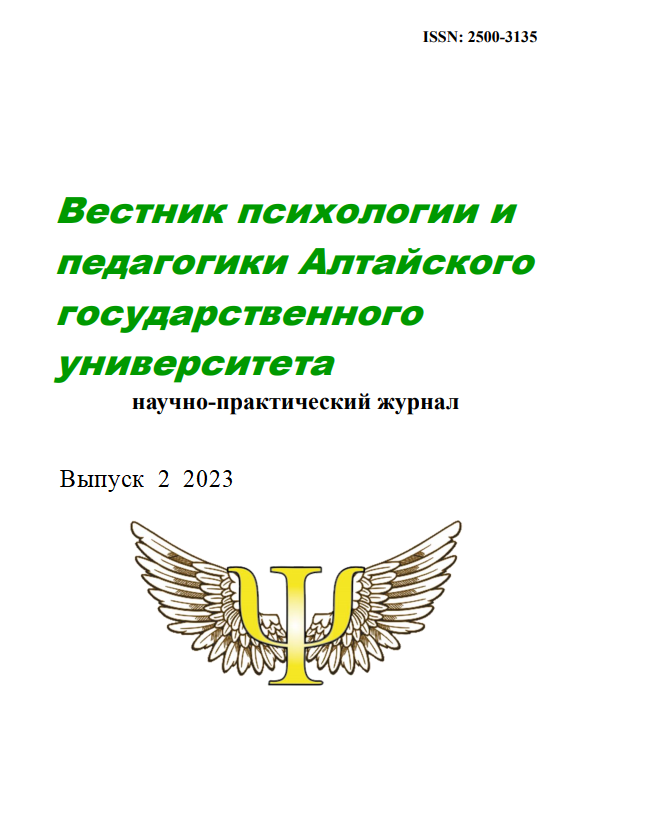FAMILY VALUES OF PARTNERS IN REGISTERED
УДК 159.99
Abstract
The article analyzes the problem of value preferences of young men and women who are in formal and informal marital relations. The results of a study conducted using psychological testing methods and mathematical data processing demonstrate that, regardless of gender and form of marriage, young people are attracted to a family model based on trust, loyalty, with the prospects of having children. In addition, it was revealed that women who are in an unregistered marriage are more focused on improving their financial situation and expanding opportunities in the areas of life they are interested in, and mutual understanding with a partner and marital fidelity seem less achievable to them. In a situation where there is an official registration of relationships, women value respect and mutual understanding more. In turn, men are encouraged to choose an informal marriage by the desire to satisfy sexual needs with the possibility of preserving valuable freedom of action for them, and the birth and upbringing of children seem more feasible in the case of legalizing relations with their spouse.
Downloads
References
Аргентова Л.В., Лидовская H.H. Сравнительное исследование проблем во взаимоотношениях супругов с зарегистрированными и незарегистрированными брачными отношениями // Сибирский психологический журнал. 2007. № 25. С. 132–136.
Гурко Т.А. Благополучие мужчин и женщин различного брачного статуса: Россия в международном контексте // Социологический журнал. 2018. № 1. С. 73–94.
Ипполитова Е.А. Семейные перспективы молодежи в изменяющемся мире : монография. Барнаул : Азбука, 2012. 220 с.
Ключко О.И., Чекалина А.А., Иоффе Е.В., Ерофеева М.А., Сухарева Н.Ф., Самосадова Е.В. Гендерные трансформации в представлениях российской студенческой молодежи // Женщина в российском обществе. 2020. № 1. С. 55–69.
Коблева З.Х. «Гражданский брак» как проявление трансформационных процессов в системе семейно-брачных отношений. Вестник Пермского национального исследовательского политехнического университета: Социально-экономические науки. 2021. № 4. С. 219–230.
Кочеткова Т.Н. Анализ проблем незарегистрированных браков // Мир науки. Педагогика и психология. 2022. Т. 10. № 2. URL: https://mir-nauki.com/PDF/23PSMN222.pdf.
Кучмаева О.В. Идеальная модель семьи в глазах россиян и стратегия по повышению ценности семейного образа жизни // Экономика. Налоги. Право. 2019. Т. 12. № 2. С. 70–82.
Реан А.A., Андреева Т.В. Психологические проблемы гражданского брака // Вестник Балтийского федерального университета им. И. Канта. 2009. № 5. С. 36–44.
Самыгин С.И., Верещагина А.В., Рачипа А.В. «Гражданский брак» в России: причины и последствия распространения в молодежной среде // Гуманитарий Юга России. 2016. Т. 17. № 1. С. 169–177.
Тащёва А.И., Фрондзей С.Н. Неофициальные и официальные молодежные семьи: психологический портрет // Вестник Адыгейского государственного университета. Серия 3: Педагогика и психология. 2011. № 1. С. 158–165.
Щербакова М.В. Сожительство как модель брачного союза // Азимут научных исследований: педагогика и психология. 2017. Т. 6. № 2 (19). С. 354–356.
References:
Argentova L.V., Lidovskaya H.H. Sravnitel'noe issledovanie problem vo vzaimootnosheniyah suprugov s zaregistrirovannymi i nezaregistrirovannymi brachnymi otnosheniyami // Sibirskij psihologicheskij zhurnal. 2007. No 25. P. 132–136.
Gurko T.A. Blagopoluchie muzhchin i zhenshchin razlichnogo brachnogo statusa: Rossiya v mezhdunarodnom kontekste // Sociologicheskij zhurnal. 2018. No 1. P. 73–94.
Ippolitova E.A. Semejnye perspektivy molodezhi v izmenyayushchemsya mire: monografiya. Barnaul : Azbuka, 2012. 220 p.
Klyuchko O.I., CHekalina A.A., Ioffe E.V., Erofeeva M.A., Suhareva N.F., Samosadova E.V. Gendernye transformacii v predstavleniyah rossijskoj studencheskoj molodezhi // ZHenshchina v rossijskom obshchestve. 2020. No 1. P. 55–69.
Kobleva Z.H. «Grazhdanskij brak» kak proyavlenie transformacionnyh processov v sisteme semejno-brachnyh otnoshenij. Vestnik Permskogo nacional'nogo issledovatel'skogo politekhnicheskogo universiteta: Social'no-ekonomicheskie nauki. 2021. No 4. P. 219–230.
Kochetkova T.N. Analiz problem nezaregistrirovannyh brakov // Mir nauki. Pedagogika psihologiya. 2022. Vol. 10. No 2. URL: https://mir-nauki.com/PDF/23PSMN222.pdf.
Kuchmaeva O.V. Ideal'naya model' sem'i v glazah rossiyan i strategiya po povysheniyu cennosti semejnogo obraza zhizni // Ekonomika. Nalogi. Pravo. 2019. Vol. 12. No 2. P. 70–82.
Rean A.A., Andreeva T.V. Psihologicheskie problemy grazhdanskogo braka // Vestnik Baltijskogo federal'nogo universiteta im. I. Kanta. 2009. No 5. P. 36–44.
Samygin S.I., Vereshchagina A.V., Rachipa A.V. «Grazhdanskij brak» v Rossii: prichiny i posledstviya rasprostraneniya v molodezhnoj srede // Gumanitarij YUga Rossii. 2016. T. 17. No 1. P. 169–177.
Tashchyova A.I., Frondzej S.N. Neoficial'nye i oficial'nye molodezhnye sem'i: psihologicheskij portret // Vestnik Adygejskogo gosudarstvennogo universiteta. Seriya 3: Pedagogika i psihologiya. 2011. No 1. P. 158–165.
Herbakova M.V. Sozhitel'stvo kak model' brachnogo soyuza // Azimut nauchnyh issledovanij: pedagogika i psihologiya. 2017. Vol. 6. No 2 (19). P. 354–356.
Bulletin of Psychology and Pedagogy of Altai State University is a golden publisher, as we allow self-archiving, but most importantly we are fully transparent about your rights.
Authors may present and discuss their findings ahead of publication: at scientific conferences, on preprint servers, in public databases, and in blogs, wikis, tweets, and other informal communication channels.
Bulletin of Psychology and Pedagogy of Altai State University allows authors to deposit manuscripts (currently under review or those for intended submission) in non-commercial, pre-print servers such as ArXiv.
Authors who publish with this journal agree to the following terms:
- Authors retain copyright and grant the journal right of first publication with the work simultaneously licensed under a Creative Commons Attribution License that allows others to share the work with an acknowledgement of the work's authorship and initial publication in this journal.
- Authors are able to enter into separate, additional contractual arrangements for the non-exclusive distribution of the journal's published version of the work (e.g., post it to an institutional repository or publish it in a book), with an acknowledgement of its initial publication in this journal.
- Authors are permitted and encouraged to post their work online (e.g., in institutional repositories or on their website) prior to and during the submission process, as it can lead to productive exchanges, as well as earlier and greater citation of published work (See The Effect of Open Access).







